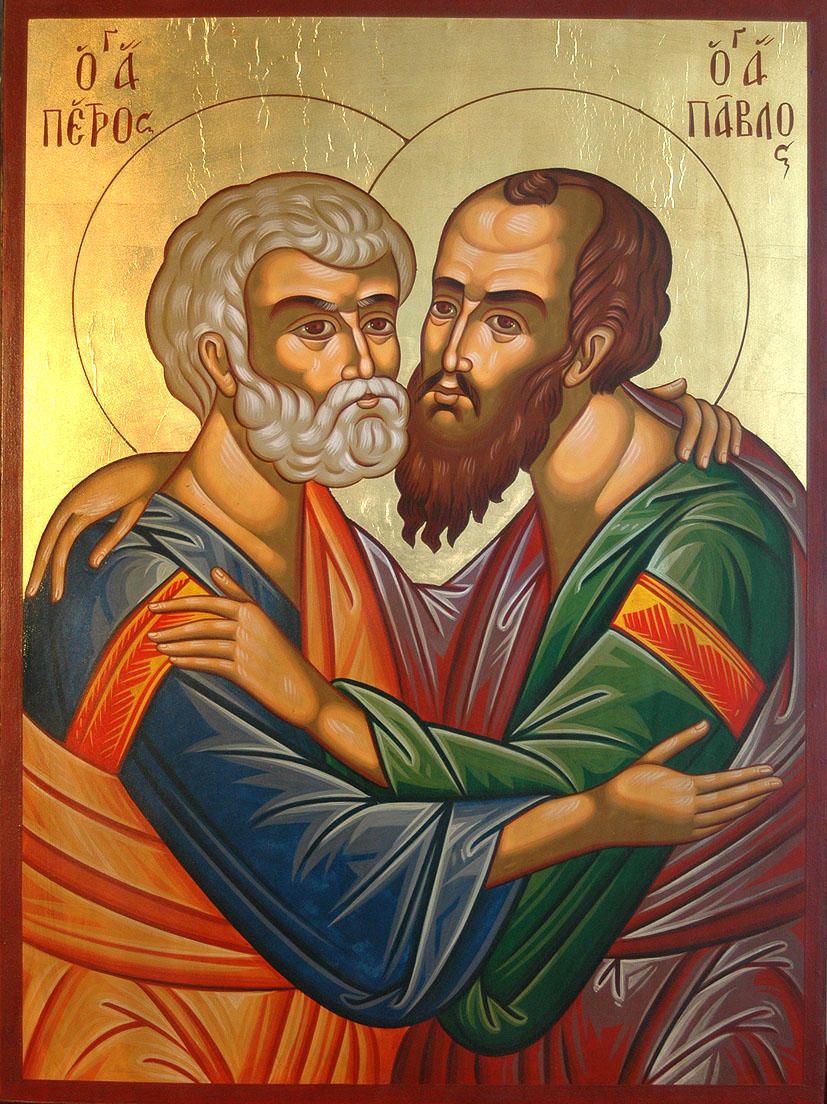Sister Doreen’s Reflections

I looked at this icon a long time, as today is the Feast of St. Peter and St. Paul, two mighty saints celebrated together. Two very different saints, different in personality and in their approach, who often confronted each other with accusations. Why are they kept together and why are they hugging each other?
I began to see this icon as an uncomfortable and challenging icon, one in which both Peter and Paul, tried, however imperfectly, to live together in their love of God, to strive to be reconciled with each other and to shake hands and even to embrace. It is an icon that sets before us that all important and oft- times uncomfortable challenge of learning to appreciate other people’s positions and point of view. I thought how this is no easy obedience to fulfill, and yet it is perhaps one of the most needed ingredients now in our life together and in our world.
Both of these saints were examples for me of sacrificial leadership. Both of these saints were not perfect people, but two troubled people who fell short of their own expectations. Joan Chittister in one of her daily meditations wrote: “Everyone deals, sometime in life, with a necessary fault. It is this that calls us to consciously choose the kind of person we want to be in life. Without these choices, what actually distinguishes character from happenstances in the human soul? Holiness depends on choices that have been tested by opportunities. … It’s the kind of shame that challenges us to the fullness of ourselves every moment of our lives …. Indeed, it is shame, a living inner shame, the awareness that we have not lived up to our own moral capacity, that challenges us to scale the very heights of human integrity. And it is that which, when honoured, grows in us, and eventually turns into holiness.”
Though important and oft-times uncomfortable, and indeed always hard personal work, in a very real way these two saints set before us a truth in this icon, that by God’s acceptance, forgiveness, mercy and grace the hostility and built-up resentment between those around us and in our world, can, within the miraculous work of reconciliation, transform and create a unity of friendship and love, where we come to God, rest in God. it is there we can let go of our fear, where we can discover hope, where we can experience acceptance. Prejudices uncovered and acknowledged can be transformed into appreciation for other people’s positions and points of view.
St Peter, who denied Jesus, lied about his relationship with Jesus at the time of the crucifixion when Jesus most needed him. Jesus who looked at Peter in sadness and unconditional love, mercy and acceptance. It was Peter who became someone with a faith upon which Jesus could rely and trust. Commanded three times “feed my sheep”, Peter was given the task to care for the growing number of Jesus-followers. It is Peter who speaks to the ‘international’ audience gathered on the day of Pentecost.
St Paul, who persecuted the early Jesus-followers, was confronted by Jesus with “why are you persecuting me”, and was forgiven, called into friendship with Jesus, offered unconditional love. We witness in him a conversion of heart. It was Paul who was commissioned to preach the good news of God’s love to all people: all people are God’s people. It was Paul who played an important role in the growth and the understanding of faith in the early Church.
I believe that they profoundly influenced each other. Two pillars of the church, ordinary people called to extraordinary vocations, they responded to that call. God used them in ways they could never have imagined. So too it is with us as we reflect upon our own calling in the light of theirs. God calls each of us to that great commission so that through us God can continue God’s mission in the world.
So today, looking at this icon of the two saints hugging each other, two people who came to this through the hard-won repentance and steadfast love of God, the message is clear. We must each do the hard work of being reconciled to each other and to shake hands and to appreciate each other’s positions, and even embrace. It is a feast day that sheds light on the importance of breaking down the barriers that have been built up, barriers of fear and resentment. It is a feast day which shows us how we are to live with each other. It is the love of God poured out to us in Creation, in God’s promise to be with us to the end of time that enables us to overcome our differences and our interpersonal struggles. It is a choice we are called to make.
